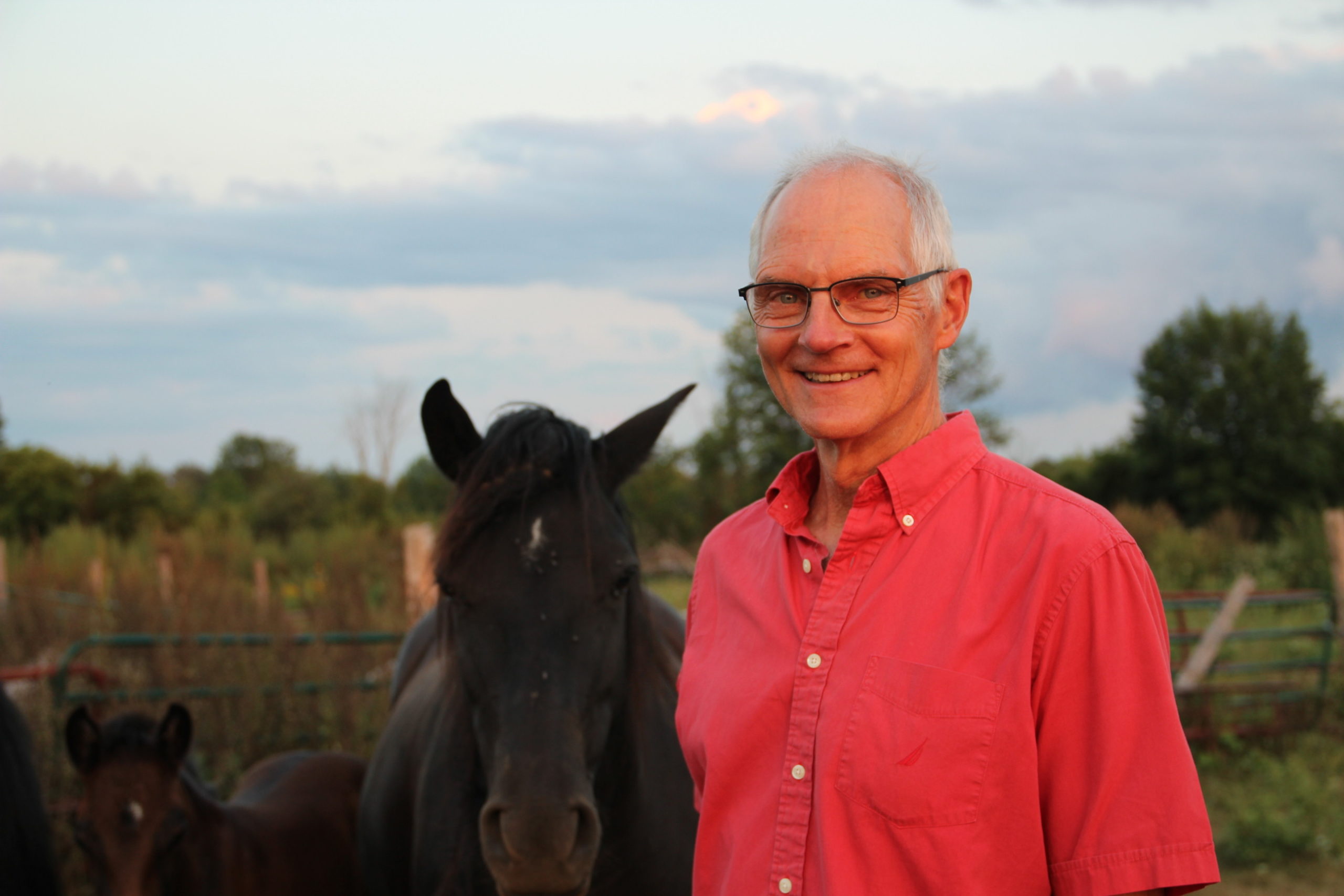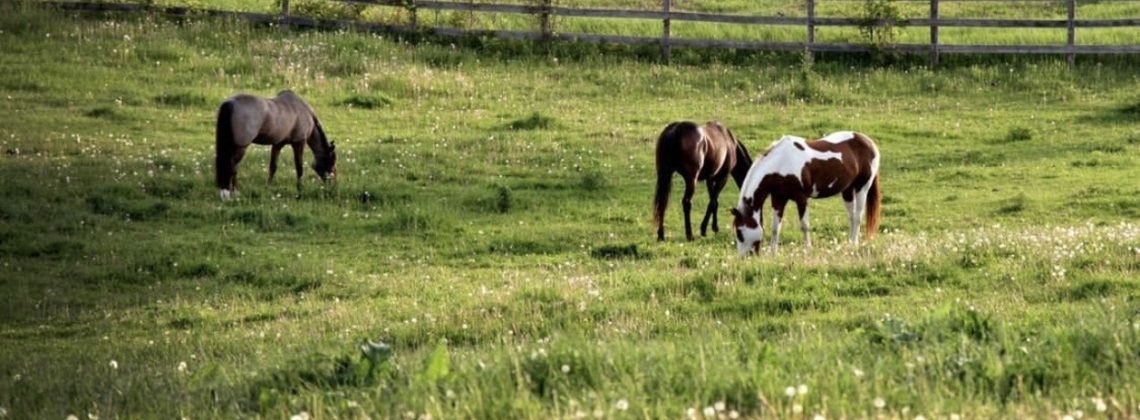Introduction to Forage – Spring ’22
- This course closed on 04/27/2022.
Welcome to the Introduction to Forage online short course on The Horse Portal!
The purpose of this course is to help horse owners and caregivers understand the importance of forage for horses and practical advice for selecting, feeding and managing forage. During the course we will learn about: the links between forage and horse health and welfare, main forms of forage, tips for evaluating forage quality, strategies and principles of keeping your pasture healthy, and how you can implement good practices at your own farm. We will also hear from experts in the field (pun intended).
- Introduction to the course
- Forms of forage
- Common forage species
- Hay and evaluating hay quality
- Hay storage, feeding and common problems
- Pasture and evaluating pasture quality
- Common problems with pastures
- Addressing Common Problems and other Best Pasture Management Practices
- Assessment of Current Practices
- New Research and Course Wrap Up
- Understand the importance of forage for the health and welfare of horses
- Describe the main forms of forage (e.g. hay and pasture)
- Describe identifying features and nutritional differences between the two types of plants commonly used in forages: grasses and legumes
- Identify plant species that are commonly used in equine forages
- Explain what factors may affect hay quality and how to evaluate hay quality
- List best practices for hay feeding and hay storage
- Explain what factors may affect pasture quality and how to evaluate pasture quality
- Describe some common problems related to horse pastures
- Explain how to prevent and/or address common problems related to pastures
- Assess current management practices and develop strategies to address any issues you have related to forage (e.g. with hay or with pasture management)
Certificate of Completion:
Upon successful completion of the course, you will receive a Certificate of Completion from Equine Guelph – the horse owner’s Centre at the University of Guelph.
Continuing Education Credits/Professional Development:
- Equestrian Canada recognizes Equine Guelph short-training online courses as qualifying for points on the NCCP Coach/Instructor Professional Development Activities Updating hours (3 points)
Time Commitment
- Occurs over a 2-week period
- 5-10 hour time commitment is required during this period
- No set times to be online each week
- Recommended you visit the course site at least 5 times a week, preferably once or more each day
Materials
- All materials are provided online within course site
- (Optional) We highly recommend the textbook Horse Pasture Management (2019), edited by Paul Sharpe, as an additional resource and guide.
Prerequisites
- 16 years of age or older
 Paul Sharpe is an animal scientist who was raised in Brandon Manitoba. He earned a Bachelors degree in Zoology and Botany, then another in Agriculture. His M.Sc. and Ph.D. degrees were on reproduction in farm animals. While working at agricultural colleges in Ontario, he performed forage management and pasture research on sheep and beef cattle. Over several years at two colleges, he taught 22 different courses to students in equine and agriculture programs and did research with alternative forages. When a degree program in Equine Management was established at the University of Guelph’s Kemptville Campus, he began teaching first year Biology and Pasture Management. While developing the Pasture Management course, he realized that there was no single comprehensive textbook on Pasture Management that was relevant to North America. Then several years later, when the Kemptville Campus was closing, his first retirement project was to recruit some American experts, whose work he had referred to and to edit and co-author a textbook called Horse Pasture Management. Dr. Sharpe continues to give lectures and answer questions for Equine Guelph and a Forage Management course at the University of Guelph. In 2020 he developed and started teaching a course called “Sustainable Practices in Agriculture” for the Business-Agriculture program at Algonquin College.
Paul Sharpe is an animal scientist who was raised in Brandon Manitoba. He earned a Bachelors degree in Zoology and Botany, then another in Agriculture. His M.Sc. and Ph.D. degrees were on reproduction in farm animals. While working at agricultural colleges in Ontario, he performed forage management and pasture research on sheep and beef cattle. Over several years at two colleges, he taught 22 different courses to students in equine and agriculture programs and did research with alternative forages. When a degree program in Equine Management was established at the University of Guelph’s Kemptville Campus, he began teaching first year Biology and Pasture Management. While developing the Pasture Management course, he realized that there was no single comprehensive textbook on Pasture Management that was relevant to North America. Then several years later, when the Kemptville Campus was closing, his first retirement project was to recruit some American experts, whose work he had referred to and to edit and co-author a textbook called Horse Pasture Management. Dr. Sharpe continues to give lectures and answer questions for Equine Guelph and a Forage Management course at the University of Guelph. In 2020 he developed and started teaching a course called “Sustainable Practices in Agriculture” for the Business-Agriculture program at Algonquin College.
 Nicole Weidner is a PhD candidate at the Ontario Veterinary College, University of Guelph. Nicole’s MSc and PhD work have focused on animal nutrition, with a focus on links between nutrition and disease. She has been fortunate enough to be mentored by board certified veterinary and PhD animal nutritionists during her time at the University. Nicole is also interested in education. She has experience as a teaching assistant and guest lecturer with courses offered by the University, and has taken several certificate programs centered around developing an understanding of various educational strategies and approaches.
Nicole Weidner is a PhD candidate at the Ontario Veterinary College, University of Guelph. Nicole’s MSc and PhD work have focused on animal nutrition, with a focus on links between nutrition and disease. She has been fortunate enough to be mentored by board certified veterinary and PhD animal nutritionists during her time at the University. Nicole is also interested in education. She has experience as a teaching assistant and guest lecturer with courses offered by the University, and has taken several certificate programs centered around developing an understanding of various educational strategies and approaches.
Eligible Partner Discounts:
Course discounts available to members of the following equine organizations:






